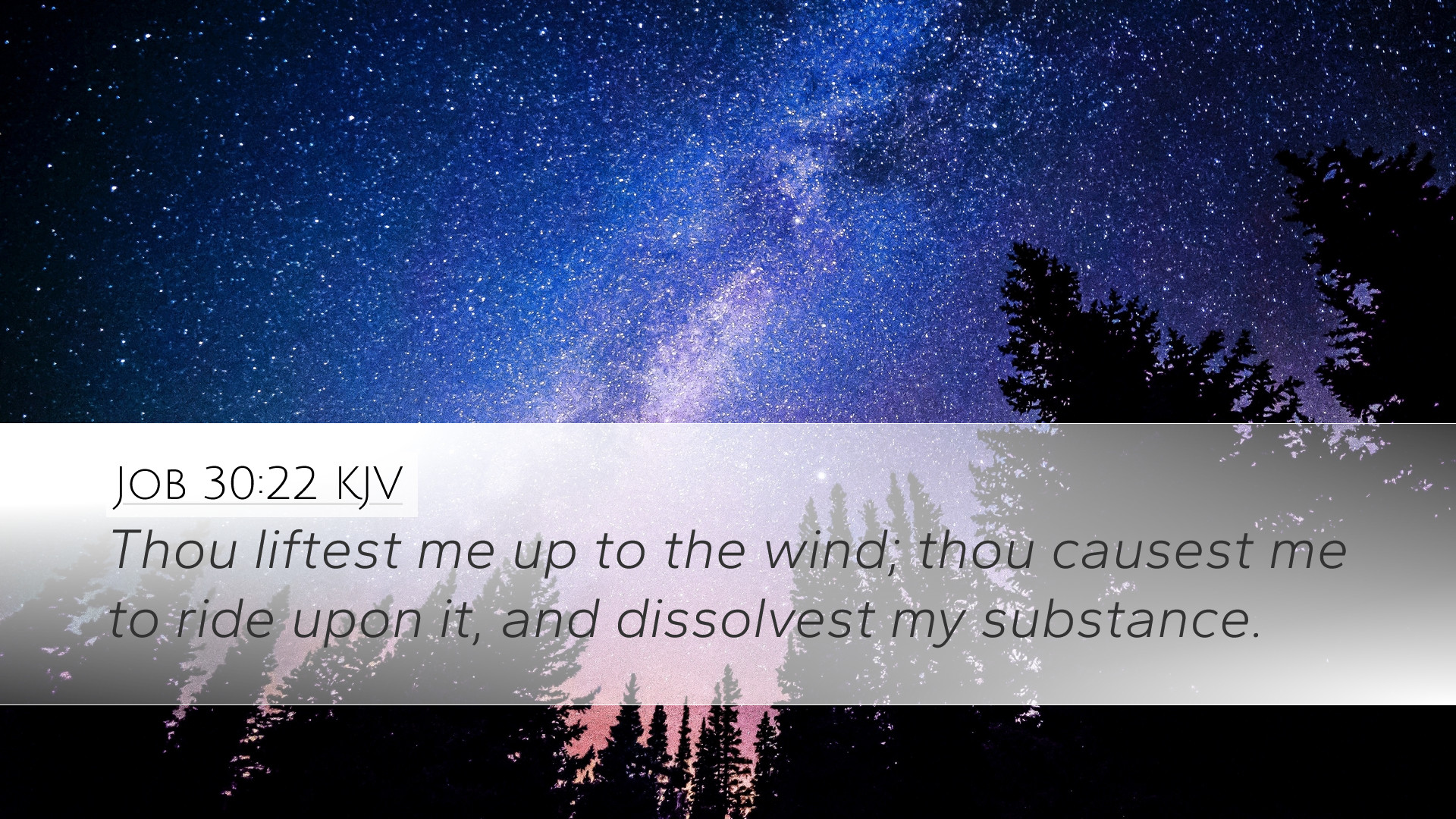Commentary on Job 30:22
Verse Text: "For you lift me up to the wind, and cause me to ride upon it, and dissolve my substance." (Job 30:22, KJV)
Introduction
The verse in focus, Job 30:22, is a poignant expression of Job’s anguish during his suffering and a profound reflection on the nature of God’s providence. This commentary draws from the insights of renowned public domain authors such as Matthew Henry, Albert Barnes, and Adam Clarke to offer a multi-faceted exploration of this scripture. Scholars and theologians will appreciate the depth of analysis provided here.
Contextual Background
Job occupies a unique place in biblical literature, addressing the issue of suffering and divine justice. In the chapters leading up to Job 30, the protagonist finds himself in overwhelming despair, contrasting his once-prosperous life with his current misery. The remarks in this verse are steeped in the broader narrative of his affliction.
Exegetical Insights
1. The Imagery of Wind
Job's metaphorical language in describing his experience indicates a feeling of being swept away by forces beyond his control. Henry highlights that Job feels as if he is at the mercy of a tempest, suggesting instability and helplessness in facing God’s actions. The wind is both a destructive force and a symbol of the fleeting nature of life, emphasizing Job’s vulnerability and transient existence.
2. The Divine Role in Human Suffering
Albert Barnes provides a critical observation that in Job’s plight, he acknowledges God's sovereignty in his suffering. The phrase "you lift me up to the wind" implies divine agency in his affliction. This challenges readers to grapple with questions regarding God’s role in human suffering. Is God the author of chaos, or does He permit suffering for greater purposes? This intricate debate raises theological reflections on divine justice and the experience of humanity in pain.
3. The Dissolution of Substance
Job’s lamentation about the "dissolving" of his substance signifies a loss of his identity and integrity, as Adam Clarke notes. Clarke explains that this can be understood both physically and spiritually; the loss refers not only to material wealth but also to Job's standing and health. This duality speaks to the often-overlooked spiritual aspect of suffering—how trials can lead to an unraveling of the self and a questioning of faith.
Theological Reflections
1. Suffering as Part of the Faith Journey
Job's explicit recognition of his plight as being divinely influenced highlights a key theological point: suffering is a universal part of the human experience, and the faithful are not exempt. This acknowledgment offers solace, particularly to those wrestling with similar adversities. Henry argues that through suffering, believers may come to deeper understandings of their faith and the nature of God.
2. The Question of God’s Justice
Through the lens of Job 30:22, the perplexity of divine justice stands at the forefront of the discussion. As Barnes notes, understanding God's ways can be confounding, especially when pain appears unmerited. The narrative of Job serves as a model for theologians to wrestle with these tough questions, reinforcing the idea that faith does not require answers to all questions of suffering.
Practical Applications
1. Embracing Vulnerability
This verse encourages pastors and spiritual leaders to acknowledge the frailty of the human condition. The imagery of being lifted by the wind is a reminder of life’s unpredictability. Leaders can foster environments where vulnerability is accepted and shared, providing community support during times of suffering.
2. Offering Hope Amidst Despair
For students and theologians, Job's cornerstone message encapsulates a vital truth: even in the depths of despair, one can find hope. The struggle of faith in the face of suffering is a narrative that resonates universally. It equips both scholars and pastors to provide counsel that uplifts those in pain while offering assurance of God's eventual justice and mercy.
Conclusion
Job 30:22 encapsulates the complexity of suffering, divine agency, and human response. Through the insights of Matthews Henry, Albert Barnes, and Adam Clarke, the verse becomes more than a lament; it transforms into a profound exploration of faith under duress. This commentary has sought to illuminate these themes with the hope that they might inspire further reflection and deeper faith in the reader, whether pastor, student, or theologian.


